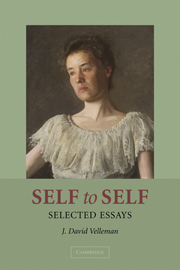Book contents
- Frontmatter
- Contents
- Acknowledgments
- Sources
- 1 Introduction
- 2 A Brief Introduction to Kantian Ethics
- 3 The Genesis of Shame
- 4 Love as a Moral Emotion
- 5 The Voice of Conscience
- 6 A Rational Superego
- 7 Don't Worry, Feel Guilty
- 8 Self to Self
- 9 The Self as Narrator
- 10 From Self Psychology to Moral Philosophy
- 11 The Centered Self
- 12 Willing the Law
- 13 Motivation by Ideal
- 14 Identification and Identity
- Bibliography
- Index
11 - The Centered Self
Published online by Cambridge University Press: 21 July 2009
- Frontmatter
- Contents
- Acknowledgments
- Sources
- 1 Introduction
- 2 A Brief Introduction to Kantian Ethics
- 3 The Genesis of Shame
- 4 Love as a Moral Emotion
- 5 The Voice of Conscience
- 6 A Rational Superego
- 7 Don't Worry, Feel Guilty
- 8 Self to Self
- 9 The Self as Narrator
- 10 From Self Psychology to Moral Philosophy
- 11 The Centered Self
- 12 Willing the Law
- 13 Motivation by Ideal
- 14 Identification and Identity
- Bibliography
- Index
Summary
In that demand he was obeying the voice of his rigid conscience, which had never left him perfectly at rest under his one act of deception – the concealment from Esther that he was not her natural father, the assertion of a false claim upon her. ‘Let my path be henceforth simple,’ he had said to himself in the anguish of that night; ‘let me seek to know what is, and if possible to declare it.’
– George Eliot, Felix HoltWe have many expressions to describe a person who is trustworthy and true – a rock, a brick, a Mensch. In a more analytical mood, we describe such a person as grounded or centered. I want to consider what it is to be grounded or centered, and then to explain what being grounded or centered has to do with being trustworthy and true.
My account begins with a quality generally regarded as distinctive of persons – namely, self-awareness. Of course, a brick or a rock isn't self-aware; but a person can be a brick or a rock in the figurative sense only through the utmost development of that which differentiates him as a person from bricks and rocks literally so called. If we want to identify the relevant differences, however, we do better to contrast a person with something that comes a bit closer to personhood – say, a cat.
- Type
- Chapter
- Information
- Self to SelfSelected Essays, pp. 253 - 283Publisher: Cambridge University PressPrint publication year: 2005
- 2
- Cited by



